Syrian Foreign Minister Asaad al-Shaibani visited Moscow on Thursday, the first visit to Russia by a high-ranking official of the Syrian “interim government” since Russia-backed dictator Bashar Assad was overthrown in December.
Russia made huge financial and military investments to prop up the Assad regime during the long and brutal civil war that began in 2011. With help from Russia and Iran, Assad seemed to have won the conflict and secured his seat of power in Damascus — only to be suddenly ousted by a lightning-fast rebel offensive in December. The surprising rout was made possible because Russia and Iran were weakened and distracted by their wars in Ukraine and Gaza, respectively.
The new Syrian government resents the Russians for supporting Assad and for granting him luxurious exile after the dictator fled with a substantial portion of the Syrian treasury tucked in his pockets. The rebels made it clear that Russia had good reasons to worry about the fate of the strategically vital air and sea bases it had established in Syria under Assad.
Shaibani said his visit to Russia was intended to mend fences and secure “mutual respect” between the two governments.
“The current period is full of various challenges and threats, but it is also an opportunity to build a united and strong Syria. And, of course, we are interested in having Russia by our side on this path,” he said.
“We are willing to provide what is possible for economic recovery. We hope they will make progress in the coming period,” Russian Foreign Minister Sergei Lavrov responded after meeting with his Syrian counterpart.
Shaibani and Lavrov jousted a bit over the recent slaughter of Druze by jihadis and Arab Muslim tribes aligned with Damascus. Shaibani thanked the Russians for “rejecting violations against Syrian sovereignty,” by which he meant the Israeli military intervening to protect Syria’s Druze.
The Russian Foreign Ministry condemned Israel’s airstrikes as an “arbitrary use of force” and a “gross violation of the country’s sovereignty and international law.” The new Syrian government’s feelings of resentment toward the Russians appear to have faded considerably after Moscow spoke out against Israel’s actions.
Lavrov reminded Shaibani that Russia also criticized the Syrian government for not doing enough to protect the Druze living in the city of Sweida.
“What happened in Sweida and on the coast exposes the administration and the people of Syria to obstacles. Returning the situation to normal and national cohesion and civil peace… all of this must be provided for all the groups and minorities in Syria,” Lavrov said on Thursday.
The Russian foreign minister also prodded Shaibani to follow through on promises to hold parliamentary elections that will “make representation and participation available for all elements of Syrian society.”
The junta government in Damascus promised on Sunday to hold elections from September 15-20. President Ahmed al-Sharaa, the former al-Qaeda and Islamic State lieutenant who now rules Syria as head of the victorious Hayat Tahrir al-Sham (HTS) rebel group, will appoint one-third of the new legislature’s 210 seats. The rest are to be filled with elections held in every province of Syria.
Syria is more bitterly divided than it was when the plan to elect an “inclusive” parliament was first proposed by Sharaa, who was eager to obtain sanctions relief and investment from Western powers by proving HTS could deliver a better government than the Assad despotism.
In addition to the Druze massacre — which Sharaa’s forces not only allowed, but participated in — there has been mass violence against the Alawites, the minority sect of Shia Islam that counted the Assad dynasty as members. Dozens of Christians were killed in a gun and bomb attack on a Damascus church in June.
Syrian Kurds remain nervous about fully integrating with the new government in part because they have good reasons to fear Sharaa will sell them out to Turkey, which regards the Syrian Kurds as a threat to its security.
Russia would clearly like some of the groups that remain friendly to Moscow to gain influence with the new government, particularly the Alawites. When the Alawites were targeted by jihadi attacks in March, many of them found refuge in Russia’s airbase in Hmeimim.
Shaibani was accompanied on his trip to Moscow by Defense Minister Murhaf Abu Qasra, a signal that Sharaa is willing to discuss the fate of the Hmeimim airbase and Russia’s naval base at Tartus.
Russian Deputy Foreign Minister Sergey Vershinin said on Thursday that Shaibani and Abu Qasra did indeed discuss the future of the bases while they were in Moscow. Vershinin said Russia pitched the bases as a “stabilizing factor in the region,” and repeated an offer Russia made in March that Hemeimim and Tartus could become “humanitarian hubs.”
“I can confirm that our contacts with Damascus on all matters are indeed ongoing. We have traditionally long-standing friendly relations with the Syrian people. I emphasize ‘with the Syrian people’ because there is no need to speak about regimes in this case,” Vershinin said.
Shaibani made an intriguing comment on Thursday about Russia supporting “transitional justice” in Syria that suggested Assad might become a bargaining chip. Handing the old dictator over to the rebels for judgment — and returning the $2 billion he looted from the national treasury on his way out — could be part of the price Russia pays for keeping its strategic Syrian real estate.
Read the full article here


